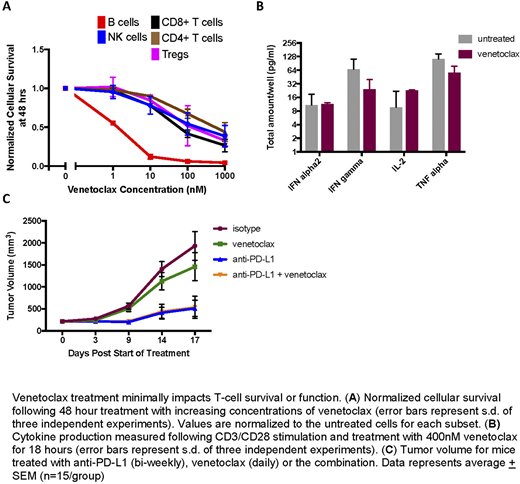Abstract
Introduction: Intrinsic apoptosis is regulated by the BCL-2 family of proteins, which consists of both anti-apoptotic (BCL-2, BCL-XL, MCL-1) and pro-apoptotic (BIM, BAX, BAK, BAD) proteins. Interaction between these proteins, as well as stringent regulation of their expression, mediates cell survival and can rapidly induce cell death. A shift in balance and overexpression of anti-apoptotic proteins is a hallmark of cancer. Venetoclax (ABT-199/GDC-0199) is a potent, selective small molecule BCL-2 inhibitor that has shown preclinical and clinical activity across hematologic malignancies and is approved for the treatment of chronic lymphocytic leukemia with 17p deletion as monotherapy and in combination with rituximab.
Objective: To investigate the effects of BCL-2 inhibition by venetoclax on viability and function of immune-cell subsets to inform combinability with cancer immunotherapies, such as anti-PD-L1.
Methods and Results: B cells, natural killer (NK) cells, CD4+ T cells, and CD8+ T cells in peripheral blood mononuclear cells (PBMCs) from healthy donors (n=3) were exposed to increasing concentrations of venetoclax that are clinically achievable in patients, and percentage of live cells was assessed by flow-cytometry using Near-IR cell staining. B cells were more sensitive to venetoclax (IC50 of ~1nM) than CD8+ T cells (IC50 ~100nM), NK cells (IC50 ~200nM), and CD4+ T cells (IC50 ~500nM) (Figure A). CD8+ T-cell subset analysis showed that unstimulated naive, but not memory cells, were sensitive to venetoclax treatment (IC50 ~30nM and 240nM, respectively). Resistance to venetoclax frequently involves compensation by other BCL-2 family proteins (BCL-XL and MCL-1). As assessed by western blot in PBMCs isolated from healthy donors (n=6), BCL-XL expression was higher in NK cells (~8-fold) and CD4+ and CD8+ T cells (~2.5-fold) than in B cells (1X). MCL-1 protein expression was higher only in CD4+ T cells (1.8-fold) relative to B cells. To evaluate the effect of venetoclax on T-cell function, CD8+ T cells were stimulated ex vivo with CD3/CD28 beads, and cytokine production and proliferation were assessed. Venetoclax treatment with 400nM drug had minimal impact on cytokine production, including interferon gamma (IFNg), tumor necrosis factor alpha (TNFa), and IL-2, in CD8+ effector, effector memory, central memory, and naïve subsets (Figure B). CD8+ T-cell proliferation was similarly resistant to venetoclax, as subsets demonstrated an IC50 >1000nM for venetoclax. Taken together, these data suggest that survival of resting NK and T cells in not impaired by venetoclax, possibly due to increased levels of BCL-XL and MCL-1, and that T-cell activation is largely independent of BCL-2 inhibition.
To evaluate dual BCL-2 inhibition and PD-L1 blockade, the syngeneic A20 murine lymphoma model that is responsive to anti-PD-L1 treatment was used. Immune-competent mice bearing A20 subcutaneous tumors were treated with clinically relevant doses of venetoclax, murine specific anti-PD-L1, or both agents. Single-agent anti-PD-L1 therapy resulted in robust tumor regression, while single-agent venetoclax had no effect. The combination of venetoclax and anti-PD-L1 resulted in efficacy comparable with single-agent anti-PD-L1 (Figure C), suggesting that BCL-2 inhibition does not impact immune-cell responses to checkpoint inhibition in vivo. These data support that venetoclax does not antagonize immune-cell function and can be combined with immunotherapy targets.
Conclusions: Our data demonstrate that significant venetoclax-induced cell death at clinically relevant drug concentrations is limited to the B-cell subset and that BCL-2 inhibition is not detrimental to survival or activation of NK- or T-cell subsets. Importantly, preclinical mouse models confirm the combinability of BCL-2 and PD-L1 inhibitors. These data support the combined use of venetoclax and cancer immunotherapy agents in the treatment of patients with hematologic and solid tumor malignancies.
Lasater:Genentech Inc: Employment. Do:Genentech Inc: Employment. Burton:Genentech Inc: Employment. Li:Genentech Inc: Employment. Oeh:Genentech Inc: Employment. Molinero:Genentech Inc: Employment, Equity Ownership, Patents & Royalties: Genentech Inc. Penuel:Genentech Inc: Employment. Sampath:Genentech Inc: Employment. Dail:Genentech: Employment, Equity Ownership. Belvin:CytomX Therapeutics: Equity Ownership. Sumiyoshi:Genentech Inc: Employment, Equity Ownership. Punnoose:Roche: Equity Ownership; Genentech Inc: Employment. Venstrom:Genentech Inc: Employment. Raval:Genentech Inc: Consultancy, Employment, Equity Ownership.
Author notes
Asterisk with author names denotes non-ASH members.


This feature is available to Subscribers Only
Sign In or Create an Account Close Modal